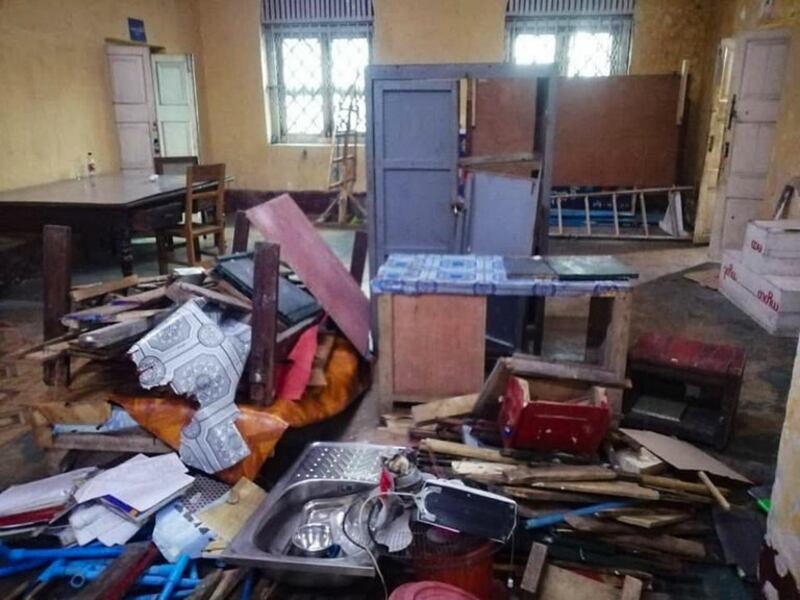Prison guards in Myanmar on Friday shot and killed a political prisoner and wounded more than 60 other people – including eight critically – after inmates protested their beating of the victim a day earlier, Radio Free Asia has learned.
The incident at Pathein Prison is the latest in a string of more than 15 violent crackdowns on protests by political prisoners – which authorities termed “riots” – in the nearly two years since Myanmar’s military seized power in a coup.
On Thursday night, guards discovered a mobile phone in the possession of Wai Yan Phyo, a prisoner of conscience serving 28 years on undisclosed charges, according to sources in Pathein Prison and others assisting political prisoners at the facility.
Following the discovery, guards pulled Wai Yan Phyo – also known as Mae Gyi – and two other inmates from their cells and beat them throughout the night before returning them on Friday morning, the sources said.
Tun Kyi, a leading member of a rights group known as the Former Political Prisoners' Society, said that when the three men explained what had happened to them to their fellow inmates and demanded they be released, authorities refused, sparking a protest by other political prisoners. Guards responded by beating and opening fire on the protesters, he said.
“At around 9:30 a.m., police and prison staff together restrained about 60 prisoners [angering other inmates]. After that the shooting occurred,” Tun Kyi said.
"Wai Yan Phyo was hit in the head by three bullets and died on the spot. The main reason was that he was taken out [of his cell] because a mobile phone was found in his possession and [the guards] tortured him all that night,” he added.
Among the wounded were Pho La Pyae, Win Min Htet, Soe Yu Kyaw, Wai Zaw Lat, Aung Tun Myint, Kyaw Ye Aung, Ye Thway Ni and an eighth man who is yet to be identified, Tun Kyi said. The eight are in critical condition, suffering from gunshot wounds and other injuries.
According to Tun Kyi, the wards housing political prisoners at Pathein Prison are now under heavy security.
Later on Friday, the junta’s information team issued a press release which said that police and prison officials had “undertaken security measures to control a riot” at the complex that was “started by inmates angered over the investigation of an inmate discovered with a mobile phone.”
The statement also blamed the death and injuries on “a clash” between the two sides. Two police officers and nine prison staff were also injured in the incident, it said.
Responding to reports of the incident, Thailand’s Assistance Association for Political Prisoners (Burma) referred to authorities’ treatment of Wai Yan Phyo and the two other inmates as “torture,” and called it “a serious and blatant violation of human rights.”

String of prison crackdowns
In August, RFA learned that authorities had violently cracked down on at least 15 peaceful protests by political prisoners since the military coup in Yangon’s notorious Insein Prison, as well as Mandalay’s Ohbo Prison, Tharrawaddy Prison, Kalay Prison, Pathein Prison, Bago Prison and Pyay Prison, based on an analysis of local news reports and interviews with family members of political prisoners.
Authorities killed at least seven prisoners in a single incident at Kalay Prison in March last year, which residents of the area said was the result of a "crackdown on those protesting ill-treatment" at the facility.
A former political prisoner at Insein Prison told RFA that Myanmar has a unique history of prison protests – with prisoners fighting against military rule from inside the walls of detention.
After the junta executed four prominent activists in July – the first judicial executions in more than 30 years – prisoners on death row are experiencing renewed trauma and fear about their own fates, he added.
According to AAPP (Burma), authorities in Myanmar have killed more than 2,700 civilians and arrested nearly 17,000 others since the coup – mostly during peaceful anti-junta protests. While authorities have released some 3,500 people, nearly 13,400 have been sentenced to prison or remain in detention.
Translated by Kyaw Min Htun. Edited by Joshua Lipes and Malcolm Foster.
